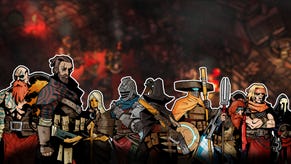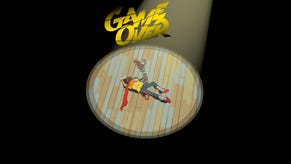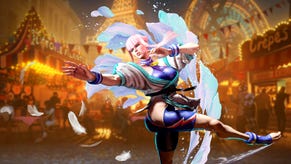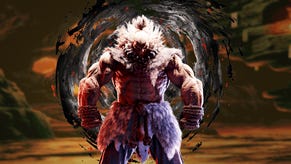JPgamer: The Fine Art of the Earworm
One of the most readily apparent ways in which Western and Eastern games differ is the matter of musical soundtracks. We take a look at how they differ, and some favorite examples of music from Japanese games.
This article first appeared on USgamer, a partner publication of VG247. Some content, such as this article, has been migrated to VG247 for posterity after USgamer's closure - but it has not been edited or further vetted by the VG247 team.
Get ready to interact, as those Flash ads say: I would like you to, right now, stand up and sing your favorite piece of music from a Japanese-developed game. Now sit down. Now do the same thing again for your favorite piece of music from a Western-developed game.
Did you find one harder than the other, regardless of whether you indulged my request literally or hypothetically? Were someone to ask me to do the same thing, I'm pretty sure I would; I would almost certainly find it much more difficult to successfully hum or sing a piece of music from a recent Western production than something from Japan.
This isn't an attempt to declare Japanese games as being somehow "superior" to Western-developed games, of course; it is, rather, an apt means of highlighting the two regions' stereotypically different approaches to scoring video games. (That's "scoring" in the musical sense, not the "reads like a 9/10" sense.)
For quite some time here in the West, the triple-A sector has desperately, desperately wanted to compete with Hollywood movies. For a dark period in the mid-'90s, a significant number of developers and publishers thought that the way forward was to put out full-motion video games starring Z-list actors directed by people who didn't really know much about cinematography. We may have left those days long behind us, but their legacy is still very much with us; modern triple-A games still attempt to emulate "summer blockbusters" at the best of times, with increasingly elaborate setpieces and spectacles designed to make us "ooh" and "aah" at every opportunity. And part of that movie-like presentation is the soundtrack: Hans Zimmer-style driving strings, triumphant brass, pounding percussion. Cinematic scores that make you very much feel "part of the moment" while it's happening -- but which, after said moment is over, you probably wouldn't be able to sing to someone.

Compare and contrast with the typical Japanese approach to soundtracks, particularly in the RPG and visual novel spaces. Rather than being inspired by orchestral, cinematic soundtracks, many Japanese soundtracks are instead composed using principles closer to what is used in pop music: simple hooks, memorable melodies and clear, repetitive structures -- perhaps a standard verse/chorus format, or something even simpler such as ternary (ABA) form -- that can easily be looped. This latter aspect is particularly important; in the case of many types of game, you'll be hearing the backing track to your activities for a lot longer than the four minutes a typical pop song lasts, so the music needs to be both suitable for looping and, ideally, not too annoying when you hear it for the 50th time.
Exceptions exist to both of these rules, of course -- there are plenty of Western indie developers composing catchy pop-inspired soundtracks, much as Japanese developers like From Software aren't averse to taking a more "cinematic" approach to their soundtracks -- but, were you to be played a selection of tracks from soundtracks you've never heard before, I'd be willing to bet you could successfully identify their region of origin in most cases.
With that in mind, I wanted to highlight a few of my favorite tracks from Japanese games in recent(ish) memory. Each of these capture the "pop-inspired" aural aesthetic I've described above rather nicely, and all are great pieces of music in their own right. As ever, I'd love to hear what you think, too; feel free to make use of the comments to share some of your own favorite pieces of music, and let's get a listening party started in here.
Loveless Angels (Demon Gaze)
Vita dungeon crawler Demon Gaze has a soundtrack that is both superb and unusual. Taking the odd step of including Vocaloid (Hatsune Miku-style) voice synthesis in many of its tracks gives the whole score a very distinctive sound, and the tracks are full of energy and dynamism. This particular track, which plays when you confront one of the titular Demons and attempt to capture them, is one of my favorites. The wailing electric lead guitar line, the driving rhythm from the percussion and the rhythm guitar, the Vocaloid backing vocals -- it all combines into a soundscape which makes these fights enormously exciting to take part in, even with their simplistic, almost animation-free presentation.
Fallen Angel (Final Fantasy XIV)
Rebooted MMO Final Fantasy XIV: A Realm Reborn has some cracking music all around, but some of the best comes during the challenging Primal fights against iconic Final Fantasy beasties like Ifrit, Garuda, Titan and Leviathan. This particular track is drawn from the battles against Garuda, a formidable foe who uses her control of the air element to make life extremely difficult for you. The baroque sounds of the harpsichord and organ throughout give the track a Gothic feel at times, while the powerful energy and extremely "busy" nature of the track help highlight the fact that you're fighting in the middle of a whirlwind. Bring a hairbrush.
Heaven (Persona 4)
No discussion of catchy Japanese game music would be complete without mentioning Shoji Meguro's astonishingly addictive Persona soundtracks -- tracks that, like Final Fantasy begat Theatrhythm, are set to spawn their own music game spinoff later this year. There are too many great tracks to count in the composer's work on the series -- not to mention his other work for Atlus -- so it's really difficult to choose just one great one. This particular one plays during a late-game dungeon in Persona 4 (and its Vita counterpart Persona 4 Golden) and is fairly representative of the distinctive Persona sound; energetic and cheerful, with a hint of melancholy always bubbling under the surface. (Said melancholy will doubtless be considerably more pronounced if you have already played Persona 4 and remember what was going on at the point you're doing this dungeon.)
Towa Battle (Time and Eternity)
Time and Eternity may have failed to impress most critics -- though I rather enjoyed it -- but one thing we can hopefully all agree on is that Yuzo "Streets of Rage" Koshiro's work on the soundtrack is outstanding, particularly when it comes to the battle themes. This particular track plays during random battles when you're playing as Towa, one of the two female leads in Time and Eternity, and the polar opposite of the demure Toki in terms of personality.
N64 Rainbow Road (Mario Kart 8)
Nintendo's composers have long been the masters of composing catchy melodies and riffs, but for a long time the instrumental sounds they used didn't really match up to the quality of composition. The most obvious examples of this are from the N64 era, where some really good tracks were spoiled somewhat by terrible-quality synthesized instruments that sounded artificial and lacked punch. Wouldn't it be great if they re-recorded some of those classic tracks using live instrume-- wait, they already did? Oh. Okay. Here's the N64's Rainbow Road theme in glorious realism-o-sound.
After Burner (Bayonetta)
Bayonetta's soundtrack is glorious. Glorious, I say. It's glorious in how utterly, unashamedly bizarre and camp it is, flipflopping back and forth between epic orchestra-and-choir numbers, J-pop remixes of of '50s jazz standards and, as heard in the video above, thoroughly modern remixes of classic video game numbers. This After Burner track is complemented by a marvellous remix of OutRun's classic "Splash Wave" track, which you can enjoy here. News of the upcoming Wii U-exclusive Bayonetta 2 has been somewhat quiet of late, but in terms of soundtrack, I'm confident that it will adopt a similarly joyful approach to music -- music that complements (or should that be contrasts with?) the bloody, hyper-violent on-screen action alarmingly well.
Magical House (The Witch and the Hundred Knight)
Nippon Ichi's The Witch and the Hundred Knight may have been a significant departure for the company both in terms of gameplay and narrative tone, but it didn't completely abandon the distinctive sound of the Disgaea series. This track in particular, heard between expeditions while you're hanging around the titular witch Metallia's house, is the most Disgaea-esque track on the soundtrack, and also an apt means of highlighting how the faintly silly backing tracks for the game are juxtaposed with the rather dark tone of the overall story. And I defy you not to sing along with the vocal bit after you've heard it a few times.
Wake of the Flying Swallow (Senran Kagura Burst)
As we've previously discussed, there's a lot more to Senran Kagura Burst than the jiggly boobs it's most widely known for; not only is it an enjoyable modern-day take on the brawler genre, it's also got a marvellous soundtrack, with each of the game's main battle themes designed to reflect the personality of the characters you hear them alongside. This clearly Phantom of the Opera-inspired track is heard when you play as Ikaruga and transform her into her powered-up Shinobi form. It's catchy, energetic -- and it encapsulates Ikaruga's serious, determined personality perfectly.
Solid Park (Hyperdimension Neptunia mk2)
And finally, Compile Heart's Hyperdimension Neptunia series of JRPGs, another franchise spinning off in the direction of music-themed games, though in this case via the "idol management" genre rather than rhythm action. This track, from the second mainline game in the series, is the main battle theme of the game and captures the feel of the game and its world nicely. It's energetic like the mostly hyperactive cast, and it's infused with the sounds of technology, reflecting the game's setting of "Gamindustri," a world which reflects... well, you can probably work it out, can't you? It's an enormously catchy battle theme, which is fortunate, since being an RPG, you'll hear it a whole lot. The video above lets you enjoy it for a whole hour. Don't say we never give you anything.

















